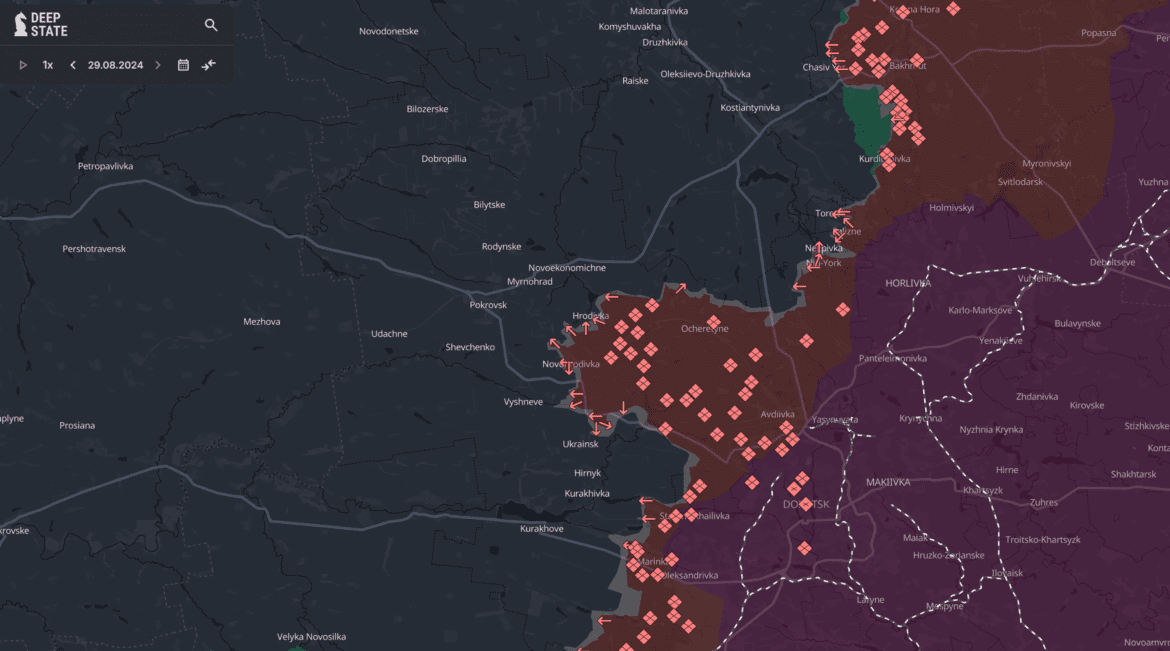Based on the materials of Financial Times, translation of the portal Conservative Platform
Satellite imagery analyzed by the Finnish investigative group Black Bird Group shows that Russian troops are now only 8 km from Pokrovsk. In response, local authorities ordered the evacuation of residents in the area.
Oleksandr Kovalenko, a military analyst with the Information Resistance group in Kyiv, called the situation on the eastern outskirts of Pokrovsk “a complete failure of defense.” “This is not the fault of ordinary soldiers who hold the positions,” he wrote in Telegram. “The problem is with those who make decisions for these soldiers,” he added, pointing to Ukraine’s leadership.
Zhenya, a Ukrainian soldier with the 93rd Mechanized Brigade who fought in the grueling 10-month battle for Bakhmut last year, described the situation in Pokrovsk as rapidly deteriorating. In his frank assessment on the website “X”, he criticized the military command: “Honestly, I have never seen anything like this. Everything is falling apart so fast,” he warned. “Pokrovsk will fall much faster than Bakhmut.”
During a press conference in Kyiv on Tuesday, President Zelenskiy described the situation on the front line near Pokrovsk as “extremely difficult” but said that the Russian offensive in the area had slowed following the advance of Ukrainian troops at the Kursk Bulge. However, according to several military analysts, including Deep State, a Ukrainian group closely affiliated with Ukraine’s Defense Ministry, Russian troops have advanced faster in Donetsk since August 6 compared to previous months.
“It’s complete chaos there,” said Roman Pogorilyi of Deep State, pointing to the fall of key towns like Novohrodivka and the threat to Pokrovsk. Over the past three weeks, Moscow forces have rapidly seized more than two dozen towns and villages with minimal resistance, including the long-held stronghold of Nyzhyk.
Rob Lee, senior fellow at the Institute for Foreign Policy Studies, attributes Russia’s success to a lack of experienced Ukrainian infantry and the diversion of resources to the Kursk offensive: “Ukraine has shifted its reserves to Kursk, leaving fewer options to fill the gaps elsewhere. Some of the more experienced brigades have been replaced by newer, less experienced units,” Lee said.
Soldiers who were mobilized this summer under the Ukrainian government’s new conscription laws, designed to replenish the dwindling ranks of the Ukrainian Armed Forces, were sent into battle without sufficient training or experience. “They freeze…they don’t know what to do in real combat,” said a lieutenant whose unit is on the front lines near Pokrovsk. Many “turn around and run away at the first explosion.”
Soldiers in artillery units near Pokrovsk also emphasized the shortage of shells and the serious mismatch in firepower compared to Russian forces. “We are running out of shells, there are simply not enough of them,” said an artillery unit commander, noting that many resources have been redirected north to Kursk. Over the past month, his unit has been firing one shell for every six to eight Russian attacks.
The situation is complicated by the fact that newly mobilized soldiers often lack proper training and experience. According to one of the lieutenants, many of them do not know how to act in a real battle and often panic during shelling. This leads to disorganization and weakening of defensive positions.
Artillery units also faced serious problems. The commander of one such unit said that his men are forced to save every shell as ammunition supplies have been significantly reduced. “We can only respond with one shot for every six to eight enemy shots,” he said. Such a disproportion in firepower puts Ukrainian defenders at a severe disadvantage.
Experts and military analysts point out that the situation near Pokrovsk is the result of strategic miscalculations by the high command. The diversion of significant forces and resources to the Kursk direction led to a weakening of defense in other parts of the front, which was exploited by Russian troops.
The situation around Pokrovsk raises serious concerns and calls into question the effectiveness of the strategic decisions of the Ukrainian leadership. Experts and the public are calling for an urgent review of tactics and redistribution of resources to strengthen the defense in Donbas to prevent further advance of Russian troops and the possible loss of key cities in the region.




